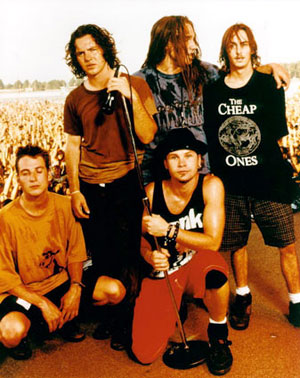
BACKDROP:
NIN, a/k/a Trent Reznor, brought the term industrial into mainstream consciousness, and I believe almost every kid I knew in high school was a fan to some degree. And why not? With the combination of abrasive soundscapes, slit-your-wrist poetry, and tortured delivery, this was every teenager’s musical wet dream. Few things were able to match the catharsis of the NIN experience.

PRETTY HATE MACHINE:
Synth pop at its scariest. Synth pop? That’s right. This albums borders more on synth pop than industrial. Sort of like Depeche Mode if they weren’t so effeminate and had some serious issues to work through. I’m sure this was pretty dangerous and breakthrough stuff at the time, well for the mainstream anyhow, but with what came later, this clearly stands as the work of an artist struggling to find his voice. There are several missteps: the rapping/spoken word attempts on “Down In It,” the overwrought melodrama of “Something I Can Never Have,” the all-around clunker “Kinda I Want To.” But when he hits the target as he does with “Head Like A Hole” and “Sin,” it’s with deadly pin-point accuracy. A good way to get in touch with my inner teen angst. You know, as opposed to my aging, on-the-cusp-of-30 angst. I just hope Reznor is embarrassed by these lyrics. I sure am.

BROKEN:
Short. Aggressive. Brutal. Perfect. Though I do prefer live versions of “Gave Up.”

THE DOWNWARD SPIRAL:
It’ll be damn near impossible for me to be objective with this album. It just meant so much to me in high school. But what was once an undeniable masterpiece is… still an undeniable masterpiece. It seemed like everyone I knew had this album, and with good reason. The lyrics dole ruminations on death, loss, faith, and identity. In other words, all the good things that weigh heavily on the teenage mind. Trent’s slit-your-wrist poetry has become rather poetic. Sure, it’s fun to yell, “I want to fuck you like an animal.” But the song really is about using carnality as an attempt to achieve a transcendent sort of intimacy that borders on spiritual, but ultimately realizing it’s a futile avenue. Okay, enough dimestore analysis. Musically, Trent carefully constructs a complicated cacophony of noise (hooray for alliteration!). This is what Beethoven would be doing if he were alive today. And unlike, say, Marilyn Manson, Reznor does not use vocal effects to disguise his voice. Rather, he is giving rise to the voices inhabiting his mind. Whether on the angry “Mr. Self Destruct,” the schizophrenic “The Becoming,” or the reflective “Hurt,” Reznor sings with such conviction, you can’t help but get sucked into his insanity. Sure, the album could be trimmed a bit, but that’d just be nitpicking. A definite must-have.

THE FRAGILE:
I’m always wary of double albums. I admire the ambition but very few artists have that much to say. I’ve gone back and forth on this, trying to decide the best way to approach THE FRAGILE, and I’ve settled on treating the two halves as separate pieces rather than tackling the album as a whole.
LEFT:
What strikes me immediately is that, despite the wide scope, the music is actually quite scaled back. For the first few tracks, Trent doesn’t assault us, mixing the white noise down and bringing melody to the forefront. The shock and contrast when we reach the pummeling “We’re In This Together” proves most effective. While not as symphonic as DOWNWARD SPIRAL, this album shows Trent’s maturity as a songwriter. Sure, thematically, he plumbs the same depths he’s done before—loss, death, isolation, et al—but this time with more restraint and sincerity than in the past. Unguarded and irony-free, this is Reznor at his most intimate and vulnerable. Even the instrumentals display heart-on-the-sleeve emotion. Is it balls-out brilliant? No. But in its own way, this is a perfect song cycle. Unfortunately, we are then led into…
RIGHT:
Truth be told, I’ve never been a fan of this disc. It always seemed to me to be little more than a collection of outtakes from the LEFT disc. I tried to give this a chance and judge it on its own merits. Problem is that after the first few tracks, there’s little of merit here. A jumbled mess that quickly loses focus and comes off as inconsequential. Taken out of context, individually, each song is not as bad as I remember. But put together, it falls short of satisfying. The solid craftsmanship of the LEFT disc just makes the patchwork of the RIGHT disc all the more frustrating. And “Starfuckers Inc” sticks out like a sore thumb; its juvenile jabs at Marilyn Manson stand in stark contrast to the mature introspection found elsewhere. Though Reznor does out-Manson Manson, the song would find a better home elsewhere.

FINAL THOUGHTS:
NIN keep releasing albums, but I haven’t given it much thought. Did I outgrow NIN? I don’t know, perhaps. But having rekindled my appreciation, I may have to check out the newer stuff. Trent Reznor is too talented for it to be all bad. The question is whether or not there’s enough good. And I don’t see the point in any of the remix albums when he mostly got the stuff right the first time.


















